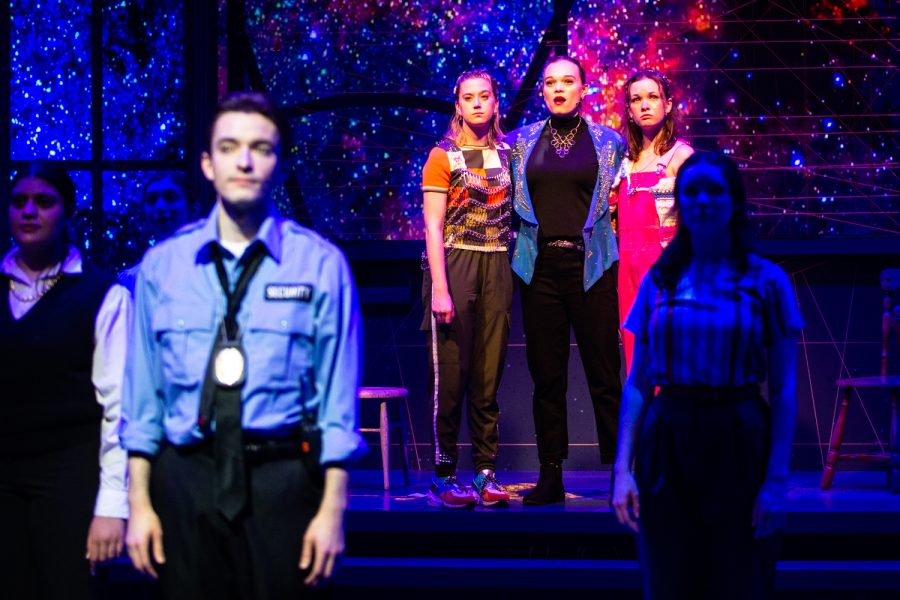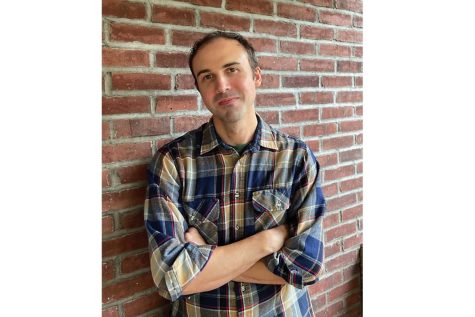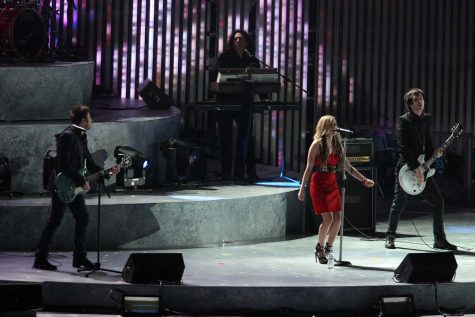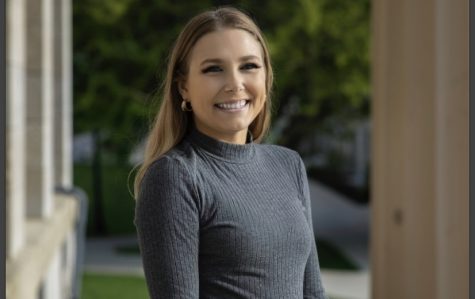Musical ‘String’ to revitalize UI Theatre Department stage
The musical, written by UI MFA playwright workshop graduate Sarah Hammond with music by ‘Ordinary Days’ creator Adam Gwon, follows the story of the Three Fates from Greek mythology, who are banished from Mount Olympus to live on Earth.
Sabrina Duke, playing Atropos, belts a song in “String” at the University of Iowa Theatre Building in Iowa City on Tuesday, March 1, 2022. “String” will play at the University of Iowa Theatre Building at the E.C. Mabie Theatre March 4-6 and March 9-12.
March 2, 2022
As a kid, one of playwright Sarah Hammond’s most beloved books was her copy of D’Aulaires’ Book of Greek Myths. Inside, tucked in the corner of a page filled with the gods and goddesses of Olympus, was a tiny illustration of three shadowy women holding a long string — the Three Fates, spinning, measuring, and ultimately cutting the Thread of Life.
Often deployed in modern retellings of Greek myths as minor, antagonistic characters in the hero’s story, the Fates and the small depiction of them in her book stuck with Hammond. It would be many years later that she would give them a story of their own, which became the musical String, developed alongside Ordinary Days creator Adam Gwon.
String opens on the University of Iowa’s Mabie Theatre stage on March 4 and will run for two weeks. Hammond, who graduated from the UI Theatre Department’s MFA playwriting workshop in 2005, said she felt “flattered and pleased” when the department reached out to her to put on a production of the show.
The musical follows the three Fates: Atropos, Lachesis, and Clotho, who are banished from Mount Olympus by Zeus to live on Earth. Living and working among mortals in the tallest building in the world, the “Infinity Building,” the Fates must find a way home, and when the eldest Fate, Atropos, falls for an ordinary security guard, she is faced with a decision that challenges the very essence of her grim responsibility.
Once a stranger to the world of musical writing, Hammond initially wrote String as a one-act play. She and Gwon took a shine to each other’s work and became good friends as fellows at a year-long theater intensive, where Gwon developed Ordinary Days and Hammond was working on a different play.
The two started collaborating on String afterward, when Gwon received a commission offer from a producer.
“He came to me and said, ‘We’ve been talking about writing a show together and I’m wondering if you have any ideas that you’d be interested in turning into a musical?’” Hammond recalled. “And I was like, ‘Well, I have this one one-act.’”
Gwon instantly saw the musical potential in the play.
“The theatrical imagination that Sarah has, to me, creates these worlds that just sing,” he said.
While many of the characters and settings remained the same, turning the play into a musical required Gwon and Hammond to rewrite much of the piece to build String’s central love story.
The process took over a year, and the second act wasn’t even finished when the two received their first workshop offer from Milliken University. Hammond remembered hurriedly finishing the musical in a small dorm room in Decatur, Illinois.
As a playwright, Hammond wasn’t sure what to expect when she heard the college-aged ensemble sing the work for the first time.
“When you’re used to playwriting, you can say all the words in your head. You can sit there and read it to yourself and imagine the scene, but with a musical and lots of choral voices — I’ve heard Adam sing the songs, I’d never heard actors sing the songs,” she said. “It was a big ensemble musical with a chorus and with three women in the center — Adam is a beautiful singer, but he’s not three women.”
RELATED: UI production ‘Gwenevere’ tackles questions of race, masculinity, and family
The actors sang, and the musical sprung to life, Hammond said.
“We finished the first draft of the show there, and it was one of the best moments of my writing life,” she said.
At the UI’s production of the musical, the cast will be doubled in size from the musical’s first professional production at Village Theatre in 2018. That performance featured just four members of the chorus assuming several different roles.
The larger ensemble, however, is exciting for both Gwon and Mark Bruckner, String’s music director.
“So much of the universe of this show, and the different worlds that it travels through — from the ethereal to the mundane — is createded by this chorus,” Gwon said. “It’s really exciting to me, and I think to Mark as well, to have a bigger chorus for this production than we did.”
The play brought the large cast plenty of challenges, but the things that have made the musical challenging have also been the most exciting to explore, String’s stage director Eric Forsythe said.
“It’s a huge, complicated piece. There are so many moving parts,” he said. “The cast is large, the orchestration is complicated, the music is very sophisticated as well as being beautiful. There’s so much heart and truth and honesty in this piece, and delving into those depths is not easy, but it’s so gratifying to go there.”
RELATED: UI Theatre Department to reimagine wall of fame
While the show marks a symbolic return for Hammond’s work to the home of the program that helped shape her as a playwright, the musical also means the return of musical theater to the Theatre Department since the pandemic. String, among several other alumni-written productions, was originally intended to be part of the department’s centennial anniversary season last year.
“It’s a musical about embracing the fullness of life, embracing love when it comes your way, and so I think that really resonates right now coming out of COVID — and we’re still not out of it — and just the idea of connection, because I think it’s gonna resonate with a lot of people,” Bruckner said. “Just being back in the theater with this many people and sharing with an audience… that’s just really exciting.”
Jami Martin-Trainor contributed to this story.





















